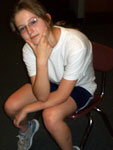BROWSE BY CATEGORY
- Archives and Libraries
- Blogs and Networking
- Bookmark This
- Digital Tools
- Examples of Teaching
- Exhibits
- Film Reviews
- History and Headlines
- Historic Sites and Museums
- Historical Thinking
- Holidays and Heritage
- Issues and Research
- Lesson Plans
- Material and Visual Culture
- Multimedia
- Organizations and Agencies
- Primary Sources
- Professional Development
- Publications
- Student Activities
- Teaching Materials
- Websites
Michael Yell on Critical Thinking and Teaching History
 ,
,  ,
, 
The advance of knowledge has been achieved not because the mind is capable of memorizing what teachers say but because it can be disciplined to ask probing questions and pursue them in a reasonable, self-critical way. Scholars pursuing knowledge submit their thinking to rigorous discipline. —Dr. Richard Paul (1)
One of the most worn and used books in my professional library is Critical Thinking: How to Prepare Students for a Rapidly Changing World by Richard Paul. Paul has been an international leader in critical thinking, and his work has been very influential in my teaching. While there are many different approaches to, and definitions of, critical thinking, Paul's view of critical thinking is that it is the development of disciplined organized thinking that monitors itself and is guided by certain intellectual standards. Further, he holds that the heart of good teaching is reasoning. It is his philosophical approach to critical thinking that, I believe, puts his ideas and concepts head and shoulders above others. It is not a "cookie cutter," "fact or opinion worksheet," "use these words when asking questions" approach.
One of the aspects of Richard Paul's work that I find so appealing, and important, is his belief that reasoning must be the center of our teaching—that we must use intellectual standards in our teaching. Noting that critical thinkers analyze and assess their thinking to improve it, he states that holding certain standards as criteria to aim for in our thinking and reasoning should be an important part of our teaching. As a normal part of their history class, students can be taught to strive for and monitor their own thinking, discussion, and writing with these standards.
 These standards include clarity, precision, accuracy, relevance, completeness, and depth. Having these standards as a target, students can learn to regularly assess their own thinking by asking such questions as "is my writing clear," "am I being complete in my discussion," and "does my response show the depth of my thinking?" That these are excellent targets at which to aim becomes obvious when we ask if it is even conceivable to state that a person is a good thinker, except that they usually give unclear, imprecise, incomplete, and shallow answers. Of course not; these standards are of the essence. (2)
These standards include clarity, precision, accuracy, relevance, completeness, and depth. Having these standards as a target, students can learn to regularly assess their own thinking by asking such questions as "is my writing clear," "am I being complete in my discussion," and "does my response show the depth of my thinking?" That these are excellent targets at which to aim becomes obvious when we ask if it is even conceivable to state that a person is a good thinker, except that they usually give unclear, imprecise, incomplete, and shallow answers. Of course not; these standards are of the essence. (2)
- Have a list of the standards you wish your students to use on the wall. For my 7th graders my list is simple and direct: Be Clear, Be Concise, Be Accurate, Be Complete, and Be Deep. I talk about them early and often, and these points always form the basics of the rubrics I use for students' work.
- Have students learn to think twice. One of my favorite posters that I have in my room shows two owls sitting side by side and the phrase below them is the phrase Think Twice. Perfect! Teach students to assess their own work, their own comments, their own thinking, by thinking through it a second time and asking themselves questions such as am I being clear, is this accurate, does my response completely answer the question, etc.
- Speak less, so that students think and discuss more. And during your class discussions do not just ask questions that can be answered in a word or two. Rather, ask probing questions that students must elaborate on (and continually ask them to do so).
- Require regular writing. Writing is thinking (on paper). It helps students systematize their thoughts.

Thinking and reasoning are the foundations of lifelong learning, and in a world characterized by continual change, we must develop in our students that which will endure: good quality thinking. What better place to do so than history class?
